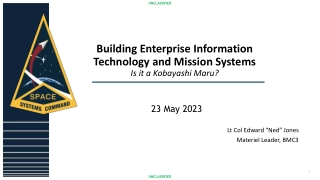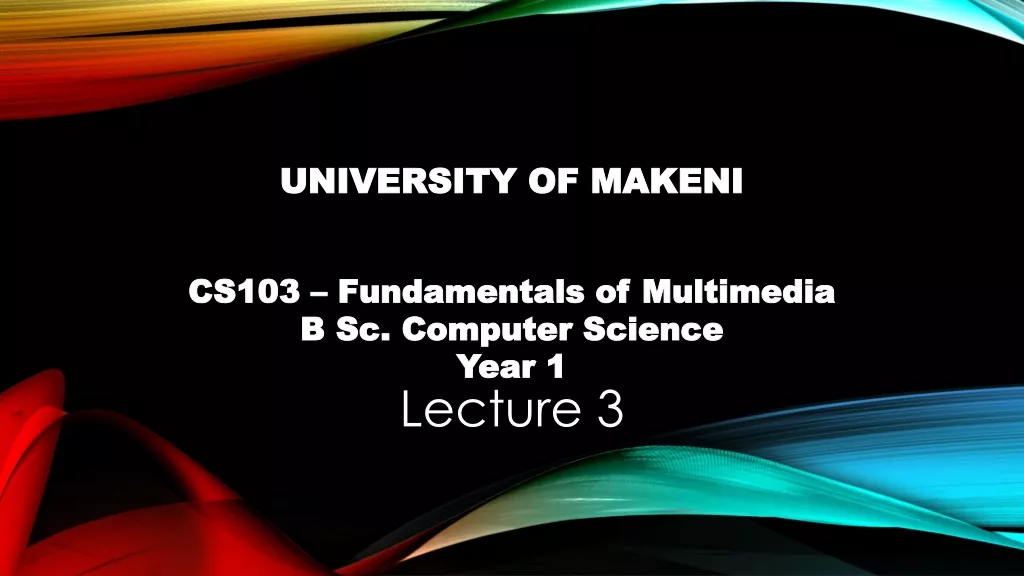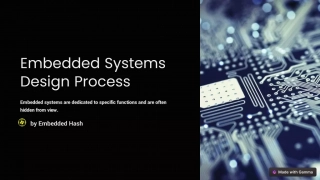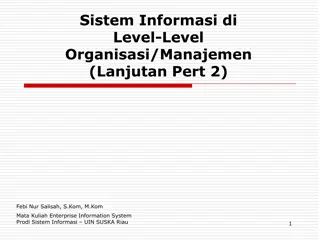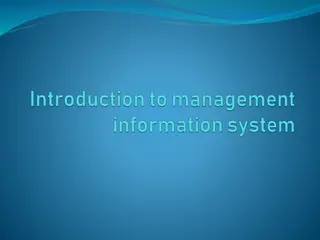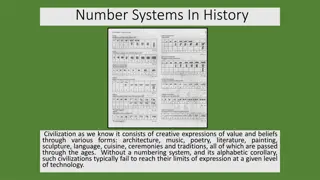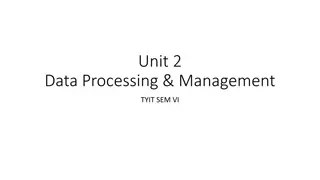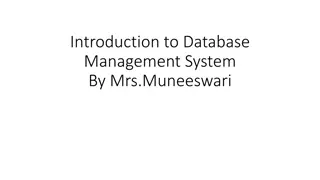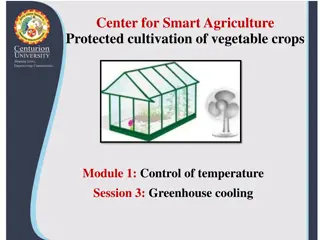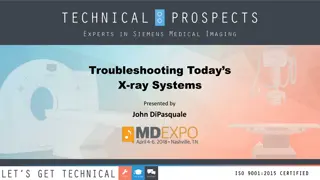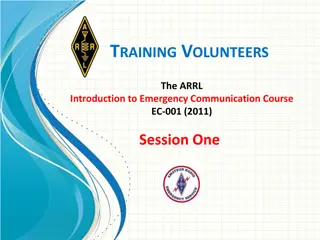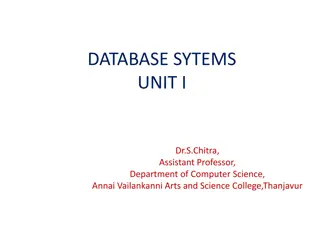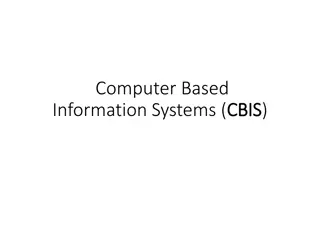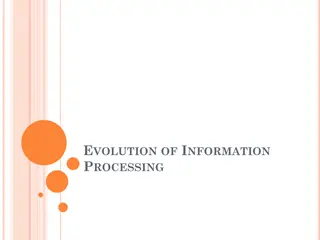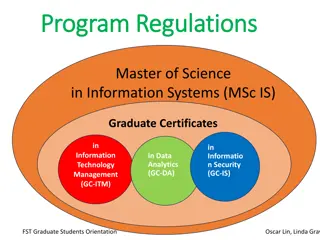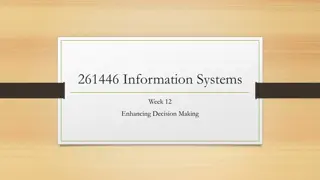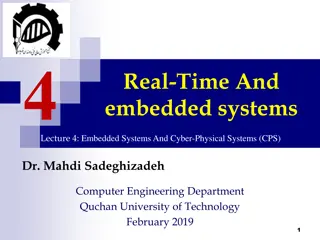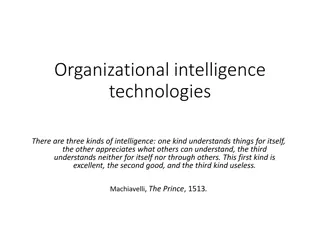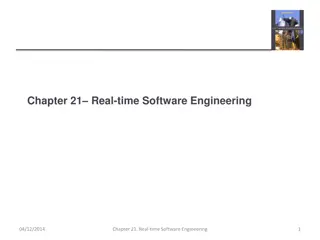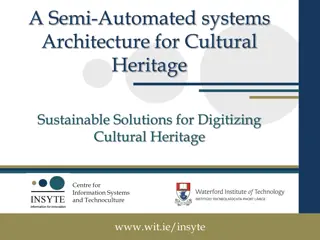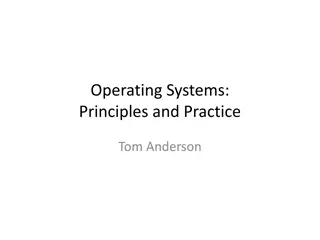Enhancing Food Systems for Improved Food Security and Job Creation
The importance of improving food systems to achieve sustainable development goals and enhance food security and job creation. It covers topics such as the current food systems, the impact of these systems, jobs in the food systems value chain, and key recommendations.
9 views • 24 slides
Building Enterprise Information Technology and Mission Systems
The document discusses the Building Enterprise Information Technology and Mission Systems program led by Lt. Col. Edward Ned Jones and focuses on the Space Systems Command's vision to deliver resilient and integrated systems for multi-domain warfighting. The content also delves into the Kill Chains
1 views • 6 slides
Multimedia Systems: Hardware and Software Components
Multimedia systems require specific hardware and software components to meet the demands of producing and playing multimedia content. Development systems are used for creating content with higher specifications, while playback systems are used for playing multimedia files with lower specifications.
9 views • 46 slides
Management Information Systems (MIS) in Business Organizations
Explore the world of Management Information Systems (MIS) in business settings, covering topics such as sales, supplier management, purchase orders, forecasting, stock details, customer orders, dispatch instructions, financial transactions, and more. Gain insights into the role of MIS in bringing or
2 views • 38 slides
Embedded Systems Design Process in the Embedded systems
Embedded systems are all around us, from the tiny microcontrollers in our household appliances to the sophisticated control systems in cars and aeroplanes. But how are these systems designed? Let's delve into the basics of the embedded systems design process in simple terms that anyone can understan
2 views • 9 slides
Strategic Information Systems for Competitive Advantage - Leveraging Technology for Business Success
Strategic Information Systems play a critical role in achieving competitive advantage in today's business landscape. This article explores the significance of strategic information systems, the integration of technology for competitive advantage, and how businesses can leverage the power of informat
3 views • 22 slides
Overview of Distributed Systems: Characteristics, Classification, Computation, Communication, and Fault Models
Characterizing Distributed Systems: Multiple autonomous computers with CPUs, memory, storage, and I/O paths, interconnected geographically, shared state, global invariants. Classifying Distributed Systems: Based on synchrony, communication medium, fault models like crash and Byzantine failures. Comp
10 views • 126 slides
Operating Systems
An operating system is a crucial program that manages all other programs on a computer. It handles tasks like input recognition, file management, and device control. There are different types of operating systems such as single-user, single-task systems, multi-user, multi-task systems, real-time ope
6 views • 11 slides
Information Systems in Organizational Management
Management in organizations is divided into three levels: operational, tactical, and strategic. Each level requires different information systems to support various activities. Operational systems focus on routine transactions and control processes, while middle-level systems aid in semi-structured
10 views • 39 slides
Explore the Top 5 Trends in Alarm Systems with Shellharbour Security Systems
Explore the latest trends in alarm systems with Shellharbour Security Systems. Learn about advancements such as smart home integration, wireless technology, AI-powered monitoring, and more. Stay informed to enhance your home or business security with cutting-edge solutions. Visit: \/\/shellharbourse
7 views • 8 slides
Management Information Systems (MIS)
Management Information Systems (MIS) are vital for collecting, processing, and analyzing data in business activities. They assist decision makers, facilitate communication, and maintain records. Components include people, data, business procedures, hardware, and software. Various types of informatio
3 views • 11 slides
Number Systems In History
Civilizations throughout history have expressed their values and beliefs through various creative forms like architecture, music, and literature. The development of numbering systems played a crucial role in advancing society's ability to communicate, track records, and engage in trade. From the ear
1 views • 17 slides
Leadership and Communication in Information Systems
Leadership in information systems involves guiding, influencing, and inspiring individuals towards common goals, while effective communication is essential for exchanging information and ideas. Qualities like vision, collaboration, and empathy make leaders successful. Different leadership styles suc
0 views • 14 slides
Evolution of Data Processing Systems in Geographic Information Science
Data processing systems in Geographic Information Science have evolved from manual, analogue methods to advanced software and hardware components. The incorporation of Geographic Information Systems (GIS) has revolutionized the handling and analysis of geo-referenced data, making tasks like data cap
3 views • 20 slides
Introduction to Database Management System Explained
This presentation covers the basics of database management systems, including definitions of data, types of data, structured and unstructured data, storing data in computers using file systems and database systems, and issues with file systems like data redundancy, inconsistency, difficult data acce
3 views • 18 slides
Different Types of Recommender Systems
Recommender systems play a crucial role in providing personalized recommendations to users. This article delves into various types of recommender systems including Collaborative Filtering, Content-Based, Knowledge-Based, and Group Recommender Systems. Collaborative Filtering involves making predicti
1 views • 7 slides
Efficient Greenhouse Cooling Systems for Smart Agriculture
Active summer cooling systems like fan-and-pad and fog systems are crucial for maintaining optimal temperatures in greenhouses. These systems work by utilizing evaporation to remove heat from the air. Fan-and-pad cooling systems have been in use since 1954, where water is passed through pads to cool
1 views • 23 slides
National Mine Safety Week 2023 - Vehicle Safety Guidelines
Explore the comprehensive safety guidelines for vehicle operation during National Mine Safety Week 2023. Learn about maintaining safety equipment, cabin safety systems, visibility safety systems, operational safety systems, emergency safety systems, other safety systems, training responsibilities, a
3 views • 10 slides
Enterprise Resource Planning (ERP) Systems
Enterprise Resource Planning (ERP) systems are comprehensive business management systems designed to coordinate resources, information, and activities within an organization. From integrated systems to non-integrated ones, ERP offers various advantages such as customization, increased data security,
2 views • 17 slides
Polymeric Controlled Drug Delivery Systems
Polymeric controlled drug delivery systems play a crucial role in regulating drug release through diffusion, solvent penetration, and chemical mechanisms. These systems include diffusion-controlled, solvent-controlled, and chemically-controlled devices, each operating based on specific principles. S
1 views • 33 slides
Troubleshooting Today's X-ray Systems by John DiPasquale
Gain insights into troubleshooting modern X-ray systems with a comprehensive guide presented by John DiPasquale. Explore X-ray system subsystems, including generator systems and imaging systems, with detailed explanations and visuals. Learn about the basics of generator systems, required circuits, a
2 views • 33 slides
Smart Antenna Systems Overview: Enhancing Wireless Performance
Smart antenna systems, like adaptive array antennas and switched beam antennas, combine antenna arrays with digital signal processing to transmit and receive signals adaptively. These systems improve signal quality, reduce interference, and increase capacity by dynamically adjusting radiation patter
0 views • 20 slides
Emergency Communication Systems for Volunteer Training
This content covers various topics related to emergency communication systems for volunteer training, including agency communication systems, government radio systems for police and fire departments, emergency medical radio systems, American Red Cross frequencies, and types of served-agency radio sy
2 views • 29 slides
Introduction to Embedded Systems Design
Embedded Systems Design, Chapter 1 provides an insightful overview of embedded systems, distinguishing them from general-purpose computers. The chapter delves into the characteristics of embedded systems, their design considerations, and the various types of embedded computers such as general-purpos
2 views • 7 slides
Database Systems in IT
Database systems play a crucial role in managing and organizing data efficiently. They provide a structured environment for storing and accessing information, enabling various applications in sectors like banking, airlines, universities, sales, and more. The transition from traditional file systems
3 views • 38 slides
Introduction to Computer Systems: Components, Types, and Functions
This session conducted by Dr. Ebenezer Ankrah covers the essential aspects of computer systems, including hardware components, types of computer systems, and information systems. Students will gain an understanding of the fundamental principles and characteristics of computer systems, enabling them
0 views • 41 slides
Computer-Based Information Systems (CBIS)
Computer-Based Information Systems (CBIS) transform raw data into valuable information to support decision-making, coordination, and control. CBIS utilize computers to collect, process, analyze, and distribute information efficiently. Data is the raw material, while information is the processed data
0 views • 27 slides
Evolution of Information Processing in Computerization
Evolution of information processing from raw data to useful information through computerization. Data is collected, processed, and converted into valuable insights for decision-making. The growth of complexity led to the development of Information Technology, enabling efficient creation, processing,
0 views • 7 slides
Graduate Programs in Information Systems and Data Analytics
Explore a range of graduate programs in Information Systems and Data Analytics, including the Master of Science in Information Systems (MSc.IS) and various Graduate Certificates. Dive into core and elective courses covering topics such as data analytics, information security, technology management,
0 views • 13 slides
Data, Information, and Knowledge in Information Studies
Data, information, and knowledge play vital roles in our lives and are essential in information studies. Dr. Perpetua Dadzie explores the definitions and distinctions among data, information, and knowledge, emphasizing the transformation process that turns raw data into meaningful information. The s
0 views • 23 slides
Information Systems in Organizations: Overview and Implementation
Information systems play a crucial role in organizations, encompassing transaction processing systems, functional area information systems, and enterprise resource planning systems. This content delves into the purpose of transaction processing systems, the support provided by information systems ac
2 views • 30 slides
Cascade Control Systems in Industrial Processes
Cascade control systems play a crucial role in improving process control efficiency by incorporating feedback loops within feedback loops. This type of control architecture helps to better handle disturbances and variations in the process by creating secondary loops that monitor specific parameters.
3 views • 8 slides
Sustainable Education for Human and Environmental Systems
Sustainable Education for Human and Environmental Systems (SHES) focuses on fostering sustainable societies through social learning and systems thinking. It aims to promote interconnectedness between human and environmental systems, with a vision of enhancing well-being while maintaining the viabili
0 views • 19 slides
Enhancing Decision Making with Information Systems
Explore the role of information systems in enhancing decision-making processes within organizations. Topics include business intelligence, types of decisions, decision-making processes, and managerial roles. Learn about structured, unstructured, and semi-structured decisions, different models of man
1 views • 21 slides
Embedded Systems and Cyber-Physical Systems
Embedded systems are specialized computer systems embedded within larger systems, such as control systems and car controllers. This lecture covers real-time aspects, applications of Cyber-Physical Systems (CPS), and examples like the Boeing 777/Airbus A380 cockpit. It discusses the design process of
1 views • 22 slides
Organizational Intelligence Technologies
Organizational intelligence technologies involve three kinds of intelligence - understanding independently, appreciating what others can understand, and understanding neither for itself nor through others. This concept emphasizes the importance of collecting, storing, processing, and interpreting da
0 views • 47 slides
Real-time Software Engineering for Embedded Systems
Embedded systems play a crucial role in controlling various machines and processes. Real-time software engineering focuses on designing systems that respond instantly to events, ensuring correctness and timeliness. Characteristics like continuous operation, unpredictable environment interactions, an
0 views • 59 slides
Semi-Automated Systems Architecture for Cultural Heritage at Centre for Information Systems and Technoculture
Explore the innovative semi-automated systems architecture for cultural heritage sustainability and digitization at the Centre for Information Systems and Technoculture. Professor Michael Cooley leads research projects focusing on digitization techniques, library metadata standards, and advanced dig
0 views • 9 slides
Operating Systems: Principles and Practice in CSE Curriculum
Dive into the world of operating systems through the lens of "Operating Systems: Principles and Practice" by Tom Anderson. Discover how this course fits in the UW CSE curriculum, covering systems programming, operating system interfaces, and distributed systems. Explore the project work on building
0 views • 21 slides
Side Channels and Information Hiding Techniques in Advanced Information Assurance
This content covers various aspects of advanced information assurance, focusing on side channels and information hiding techniques such as digital watermarking, steganography, and covert channels. It discusses the concept of side-channel attacks, types of system and network channels, fault attacks,
0 views • 24 slides

